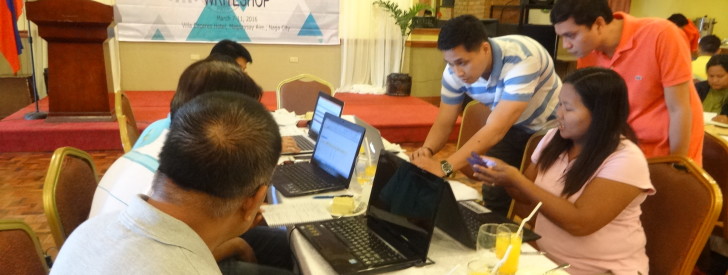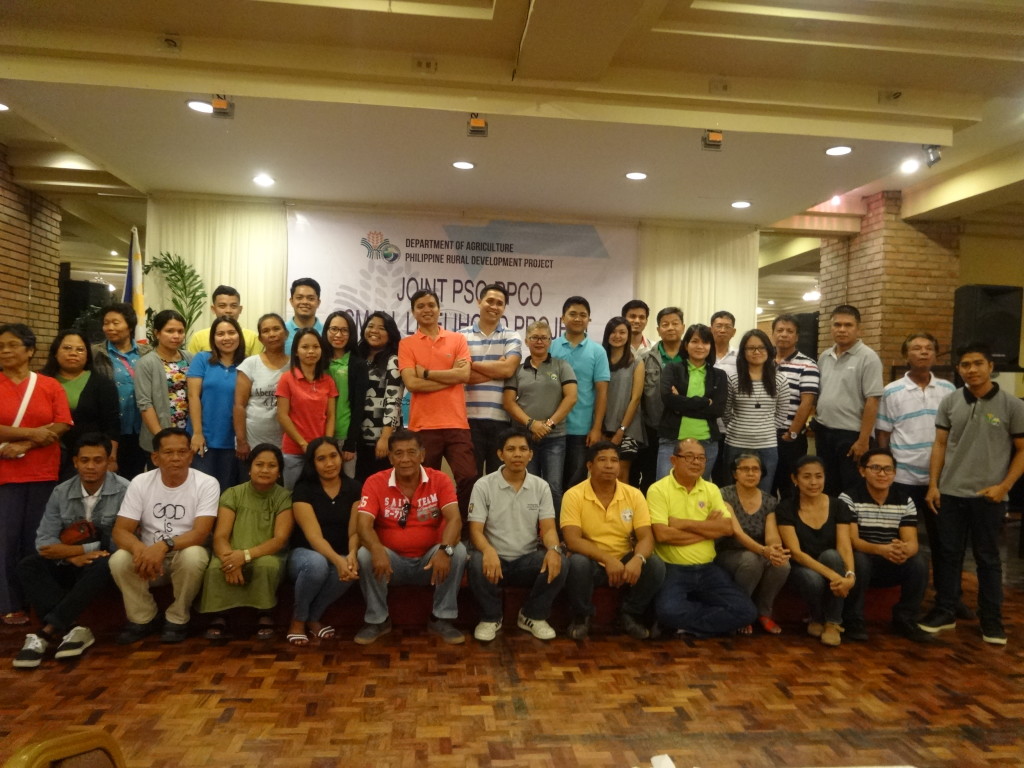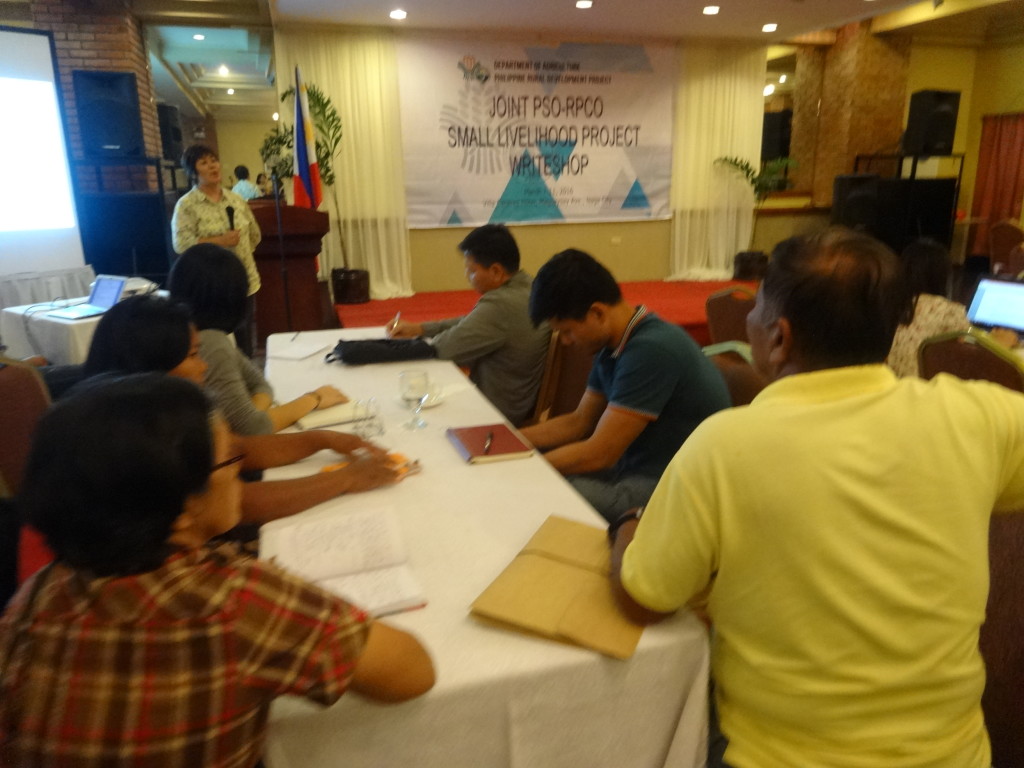 PRDP South Luzon Director Shandy M. Hubilla (2nd from right) and PSO South Luzon I-REAP Component Head Manolo Luis Herrera (3rd from right) assess an SLP proposal during the Joint PSO-RPCO Small Livelihood Project Writeshop held on March 7-11, 2016 in Naga City.
PRDP South Luzon Director Shandy M. Hubilla (2nd from right) and PSO South Luzon I-REAP Component Head Manolo Luis Herrera (3rd from right) assess an SLP proposal during the Joint PSO-RPCO Small Livelihood Project Writeshop held on March 7-11, 2016 in Naga City. Calamity-hit communities in Bicol to benefit from small livelihood projects
About 22 communities in five calamity-stricken provinces in Bicol have the opportunity to benefit from small livelihood projects (SLPs) under the Department of Agriculture’s Philippine Rural Development Project (DA PRDP).
SLPs for calamity-stricken areas under PRDP’s enterprise development component offer immediate assistance to farmers and fisherfolk organizations who are qualified to avail of the said project. These assistance include sustainable income-generating activities as well as production and marketing support worth P1.2 million. Five provinces in Bicol were identified as beneficiaries of SLPs namely Albay, Sorsogon, Catanduanes, Masbate and Camarines Sur based on the proposal approved by the National Project Coordination Office (NPCO) on January 29, 2016. These were the areas that declared state of calamity and suffered great agriculture and infrastructure losses caused by typhoons Lando and Nona .
The I-REAP teams of Bicol and South Luzon conducted a Project Writeshop on March 7-11, 2016 in Naga City to assess the eligibility of proponent groups from calamity-hit areas and assist them and their respective Provincial/Municipal Project Management and Implementing Units (P/MPMIUs) in preparing the business models and translating them into financial plans.
“These are communities that are very vulnerable. PRDP’s small livelihood projects for typhoon-stricken areas offer help that they can get so this is a good starting point,” PRDP South Luzon Director Shandy M. Hubilla said.
He said that the diversity of commodities being eyed by Bicol farmers and fisherfolk under PRDP’s SLP have the potential to create immediate impact on the ground. Proposed SLPs include production, marketing, value-adding and trading of different commodities like cassava, ginger and seaweeds. The project management also accepted proposals for farrow to finish swine production, broiler production, and enhancing farm capacity and adoption of nutrition technology for goat production, among others.
Roberto A. Salgado, president of the Samahang Mangingisda ng Tomalaytay, said that with the help from PRDP staff and the PPMIU-Sorsogon, his group was able to create a concrete plan for the seaweeds production and marketing SLP.
“Ito ang kabuhayan na halos kinamulatan na namin. Kung meron na kami tapos tutulungan pa kami ng PRDP, malaking tulong ito para sa additional income ng mga mangingisda at seaweed farmer. Magandang oportunidad ito para patunayan na seaweeds ang isa sa pinakamagandang hanap-buhay na pwedeng tangkilikin ng tao at maging modelo sa aming bayan na sa kabila ng mga sakuna, wag mawalan ng lakas ng loob,” he said.
Peter Theodore D. Caro, secretary of the Albay Small Ruminant Raisers Association (ASRRA), believes that with PRDP’s support, his proposal entitled “Enhancing Farm Capacity and Adoption of Nutrition Technology for Goat Production” will make livestock farmers more resilient to climate change.
PRDP Bicol I-REAP Component Head Adelina A. Losa said that the volume of SLP proposals is a manifestation of the effective orientations conducted by the region to all the concerned provinces. She also commended the active partnership of the PSO and RPCO in assisting the proponent groups.
“Kung magkatotoo ining proyekto, dakula ang impact kaini lalo na duman sa mga lugar na heavily damaged. Dai man maibalik su dati nindang livelihood at least matawan sinda ning bagong source of livelihood,” she added.
South Luzon I-REAP Component Head Manolo Luis Herrera called for extra efforts and commitment from the proponent groups and provincial project units in complying with PRDP requirements based on the prescribed timelines and guarantee approval of the proposed SLPs. Complete SLP documentary requirements must be submitted to the RPCO V on or before March 31, 2016 for review and revision and possible approval by the Regional Project Advisory Board on April 28, 2016.
“We’re aiming for immediate assistance that’s why we have these timelines–immediate recovery in terms of livelihood,” he emphasized.
To guarantee effective preparation and implementation of SLP projects, Herrera recommends that I-REAP Bicol should engage experts who have the technical competency in designing non-conventional commodities. He added that proponent groups who will perform well in the SLP may be considered as future partners for regular enterprise projects.
Moreover, Monitoring and Evaluation (M & E) Officer Lorenzo Villacorte Jr., Compliance Officer Michael Gregory Vargas, and Social Environmental Safeguards (SES) Focal Person Maria Iris D. Millendez briefly oriented the participants on data sets required for the projects.
PRDP is a six-year development project being implemented by the DA designed to raise farmers’ income and establish a more market-oriented and climate-resilient agri-fishery sector. (Annielyn L. Baleza, I-SUPPORT InfoACE Unit, DA-RAFIS 5)

PRDP South Luzon Director Shandy M. Hubilla (center, in orange) pose with the PSO and RPCO V I-REAP teams and participants of the Joint PSO-RPCO Small Livelihood Project Writeshop held on March 7-11, 2016 in Naga City.

